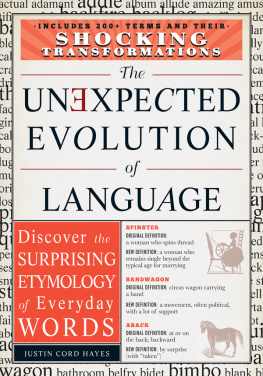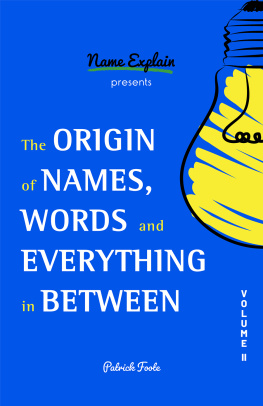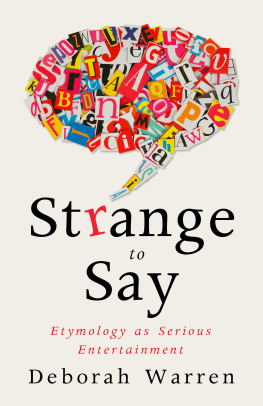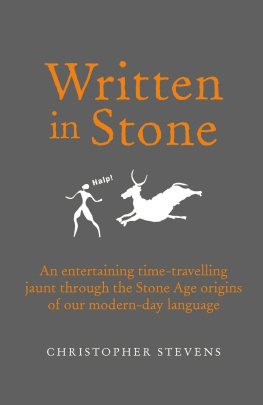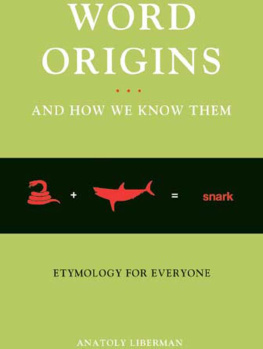Introduction
English is the mutt, the Heinz 57, the bastard child of every language that came before it. Thats why its so inscrutable to those who encounter it after learning their well-behaved, logical languages. Our words trace gnarly roots that sometimes dead end, and were certainly not averse to coining words that have no roots or reason at all. (Hornswoggle, anyone?)
Its those gnarly roots that youll find in this book. Some of the English words you think youre familiar with actually used to mean something quite different. How on earth does a definition just change, you ask? Well, it depends. The definitions of the words in this book were twisted due to historical events, cultural adjustments, or technological advancements. The fascinating stories behind these transformations are surprising (see entry for stadium), thoughtful (see entry for acquit), and sometimes pretty funny (see entry for occupy). One thing to keep in mind is that English is really three Englishes: old, middle, and modern. Ask most people which one was Shakespeares purview, and theyll say, Oh, he wrote in Middle English. Nope, sorry. He wrote in Modern English. Dont let all those forsooths, cozes, and fiddlesticks throw you off.
Before we get started, its helpful to know a little bit about the origins of the English language. Old English lasted from roughly A.D. 700 to about A.D. 1100. The grammar of Old English was closely related to Latin. Old English, also called Anglo-Saxon, was spoken by the Anglo-Saxons. These were Germanic tribes who invaded and then settled in portions of what is today Great Britain.
Old English is indecipherable to us today; its basically a foreign language. Nonetheless, we do have surviving Old English texts such as Caedmons Hymn. This nine-line poem written in honor of God is the acorn (see entry for acorn) from which has grown the mighty oak of literature in English. Written around A.D. 700, its the oldest piece of English literature known to exist. Old English also is the language of the epic Beowulf .
For all intents and purposes, Old English ended with the famous Norman Conquest. The Normans were French and defeated the English, the erstwhile Anglo-Saxons, at the Battle of Hastings on October 14, 1066. Middle English survived until the 1400s. Its the language of Geoffrey Chaucer, author of the immortal TheCanterbury Tales. Though its written in Middle English, most people today can read and understand those stories, as long as the text contains plenty of footnotes.
Middle English shifted to Modern English when many in England adopted the Chancery Standard, a form of English spoken in London. The standard was adapted, in part, because of the printing press, introduced to England around 1470. Thus, Modern English took over by the 1500s and holds sway today. Its the language of everything from Shakespeare to Dickens to Hawthorne to Dickinson to Faulkner to all those annoying bloggers who cant spell.
Modern English rose at the time of great world exploration and is now the polyglot stew we know and usually love (but sometimes abhor). Perhaps due to its mutt-like origins, we English speakers continue to coin words and phrases with a frequency that would have shocked Chaucer and probably even Shakespeare.
With centuries of history under its belt, maybe its not so surprising that English words have changed meanings over the years. Sometimes, we easily can trace why a word once meant this but now means that; yet, at other times, the only things to rely on are common sense and speculation based on historical trends.
What follows are about 200 words that used to mean one thing and now mean something else. Some of them have changed in logical, sensible ways, while others have undergone the linguistic equivalent of complete reconstructive surgeryshifting, for example, from a verb to a noun or vice versabringing them to the point where even these words mothers wouldnt recognize them. But what do you expect from a language thats the semantic cross between a Dutch elm, an oak, and a Japanese maple?
A
aback
ORIGINAL DEFINITION: at or on the back; backward
NEW DEFINITION: by surprise (with taken)
Youre most familiar with this word from the expression taken aback. Come to think of it do you ever hear the word without taken as its partner? When the word first popped up, in the middle of the Middle Ages, you might have.
For example, you might have carried your wares aback, meaning on your back. Or the wind might have been aback, meaning at your back. These seem like perfectly reasonable uses of the word aback, but they lost favor completely by the middle of the nineteenth century.
The word as we know it todayas part of the expression taken abackcame about for nautical reasons. When finicky winds change direction quickly, boats sails can deflate and hang limply back onto the ships mast. Eventually, sailors began to refer to this condition as being taken aback.
One hundred years later, the expression became metaphorical. After all, you can imagine that wind suddenly changing direction for no apparent reason was surprising and dismaying. By extension, anytime you are taken aback, you are surprised and dismayed.
abode
ORIGINAL DEFINITION: delay; act of waiting
NEW DEFINITION: formal word for ones home
The words abode and abide spring from the same source. In fact, from the 1200s to the 1500s, they meant the same thingwait, withstand, or tolerate. The words were connected because of the manner in which Old English verbs were conjugated: Abode was a past tense version of abide.
Then, during the 1500s and 1600s, abide still meant wait, withstand, or tolerate, while abode changed to refer to ones home. One reason for the change is metaphorical. If you think about it, people spend a lot of time waiting at home. In the sixteenth century, people waited for dinner to be slaughtered, for wool to be spun into coats, and for the kids to come home from whatever bad stuff they were doing. Today, people wait for their favorite TV show to come on, and for the kids to come home from whatever bad stuff theyre doing. As people aboded in their homes, they just began to refer to their dwellings as abodes.
The modern, mostly European, concept of right of abode captures both the old and new meanings of the word. The right allows people to be free from immigration authorities and to have a right to work and live in a particular country. Thus, they can wait as long as they like in a nation, and have an abode there as well.
accentuate
ORIGINAL DEFINITION: to pronounce with an accent
NEW DEFINITION: to emphasize
Our worlds increasingly polyglot nature led to the change in the word accentuate. Originally, it meant to pronounce with an accent. As cultures and their respective languages mingled, people had to work extra hard to be understood. As a result, they spoke carefully so that people could understand their accentuated (spoken with an accent) words. Thus, its not much of a leap for the word to shift from speaking with an accent to carefully emphasizing each word so that other people can understand what youre saying.
After the shift occurred, accentuate began to mean emphasize. By the middle of the nineteenth century, accentuate had all but lost its original meaning. In writing, accentuate means to mark with written accents. For example, if youre writing out the meter of a poem, you use accentuating marks to indicate how to scan lines (analyze them rhythmically).

